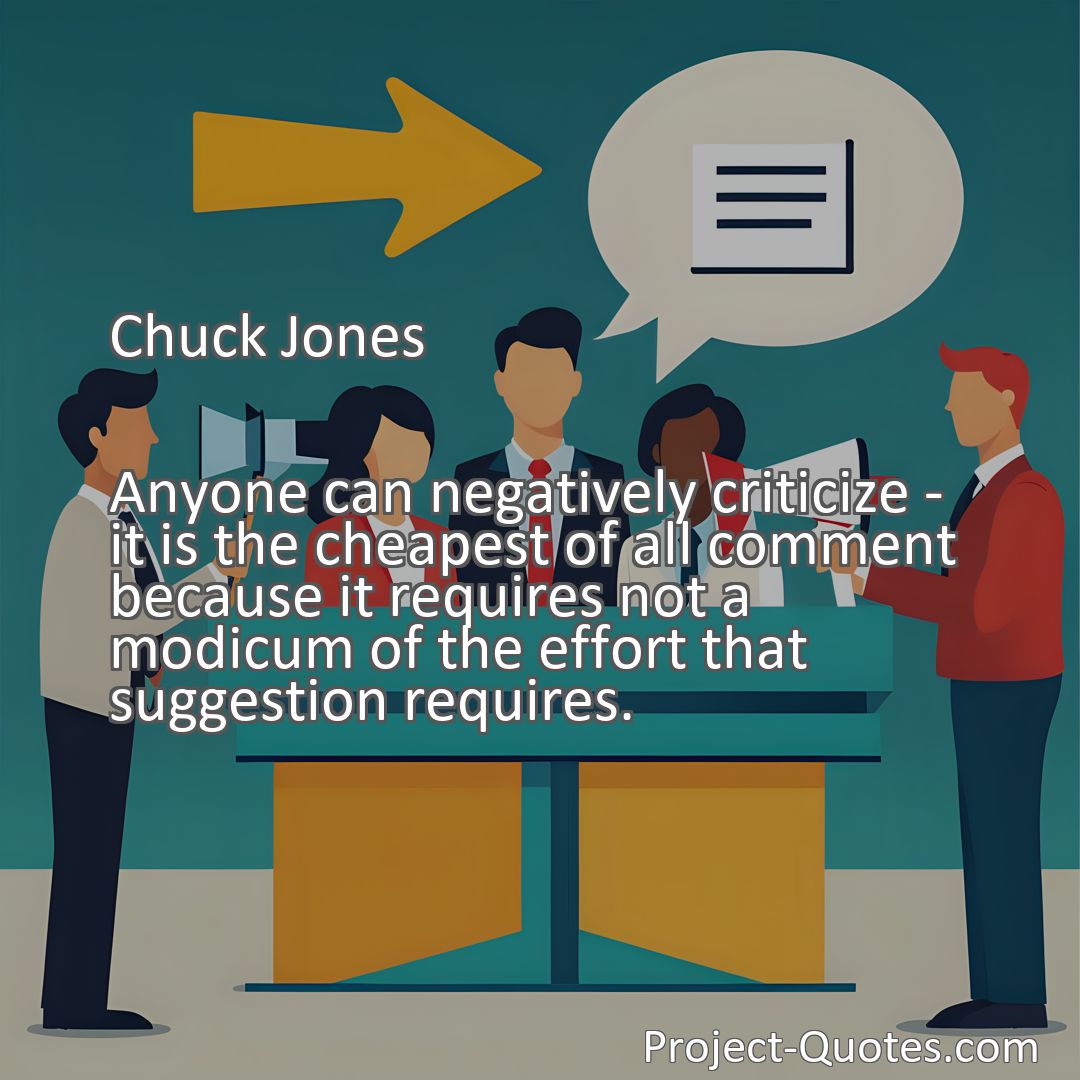Anyone can negatively criticize – it is the cheapest of all comment because it requires not a modicum of the effort that suggestion requires.
Chuck Jones
“The Power of Constructive Criticism: Embracing Growth and Improvement” explores the difference between negative criticism and constructive feedback, highlighting the importance of offering valuable suggestions rather than tearing others down. By embracing constructive criticism, cultivating a growth mindset, and valuing suggestions over negativity, individuals can create a supportive environment that encourages personal and collective growth. With constructive criticism, we have the power to help others improve while fostering our own development.
Table of Contents
- 1 Anyone can negatively criticize – it is the cheapest of all comment because it requires not a modicum of the effort that suggestion requires.
- 2 Chuck Jones
- 3 Meaning of Quote – Anyone can negatively criticize – it is the cheapest of all comment because it requires not a modicum of the effort that suggestion requires.
- 4 Freely Shareable Quote Image
- 5 Related
Meaning of Quote – Anyone can negatively criticize – it is the cheapest of all comment because it requires not a modicum of the effort that suggestion requires.
The Power of Constructive Criticism: Valuing Suggestions Over Negativity
Introduction :
In a world full of opinions, it is important to understand the difference between negative criticism and constructive feedback. The renowned American animator, Chuck Jones, once said, “Anyone can negatively criticize – it is the cheapest of all comment because it requires not a modicum of the effort that suggestion requires.” These wise words remind us of the importance of offering valuable suggestions rather than simply tearing down others. In this article, we will explore the significance of constructive criticism, how it fosters growth and improvement, and how we can better embrace this approach in our daily lives.
The Importance of Constructive Criticism :
Constructive criticism is a valuable tool that helps individuals improve their skills and abilities. Unlike negative criticism, which aims to belittle or tear down, constructive criticism provides guidance and offers suggestions for improvement. It focuses on identifying strengths as well as areas that need development, ultimately inspiring personal growth.
By embracing constructive criticism, we open ourselves up to new perspectives and opportunities to enhance our abilities. Just like a sculptor refining their masterpiece or an author editing their manuscript, constructive feedback allows us to reassess our work and make necessary adjustments. It fuels progress and helps us reach our full potential.
Growth Mindset and Constructive Criticism :
In order to value constructive criticism, we must first cultivate a growth mindset. Embracing a growth mindset means understanding that failures and setbacks are opportunities for learning and improvement. When we approach criticism with this mindset, we become more open to suggestions, viewing them as stepping stones rather than roadblocks.
Receiving constructive criticism can initially be a disheartening experience. However, when we allow ourselves to separate the critique from our self-worth, we can approach it with objectivity and a willingness to learn. By understanding that feedback is not a personal attack but an opportunity to grow, we can appreciate the effort put into providing that feedback.
Constructive Criticism in Daily Life :
Constructive criticism is not limited to the realms of art or academia; it is a crucial facet of everyday life. Whether it’s giving or receiving feedback on school assignments, participating in team sports, or working collaboratively on group projects, constructive feedback plays a fundamental role in personal and collective growth.
For teachers, providing constructive criticism empowers students by highlighting areas for improvement without discouraging their efforts. On the other hand, students can learn to embrace constructive criticism, actively seeking it to refine their skills and achieve better results.
Similarly, in the workplace, supervisors can promote a growth-oriented environment by offering constructive criticism that supports professional development. By acknowledging the value of suggestions rather than focusing on negative criticism, individuals can create a harmonious and supportive workplace culture.
Conclusion :
In conclusion, Chuck Jones’s quote on negative criticism serves as a reminder of the significant impact constructive feedback has on personal growth. Constructive criticism, unlike its negative counterpart, requires effort and empathy to provide suggestions for improvement. By embracing constructive feedback, we cultivate a growth mindset, viewing criticism as an opportunity rather than a setback.
Constructive criticism has the power to help us fulfill our potential in various aspects of life, including academics, careers, and personal relationships. As we continue to value suggestions over negativity, we create a supportive environment that encourages growth and development.
Let us remember that the purpose of constructive criticism is not to tear down others but to help them improve. By offering valuable suggestions and embracing feedback, we contribute positively to the growth and success of others while fostering our own personal development.
I hope this quote inspired image brings you hope and peace. Share it with someone who needs it today!


